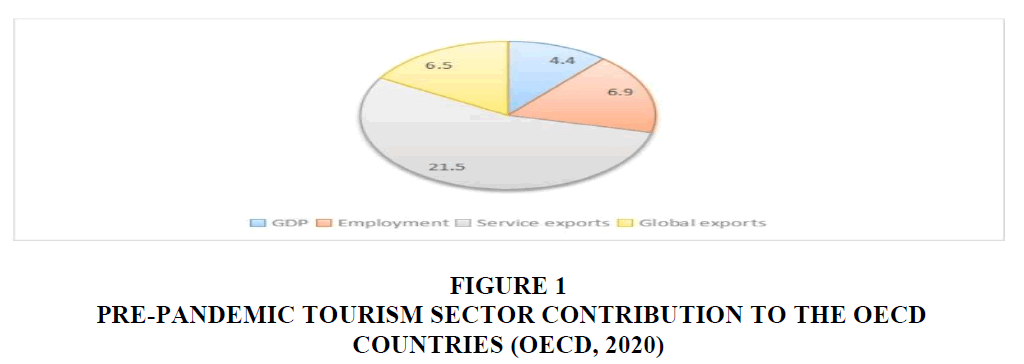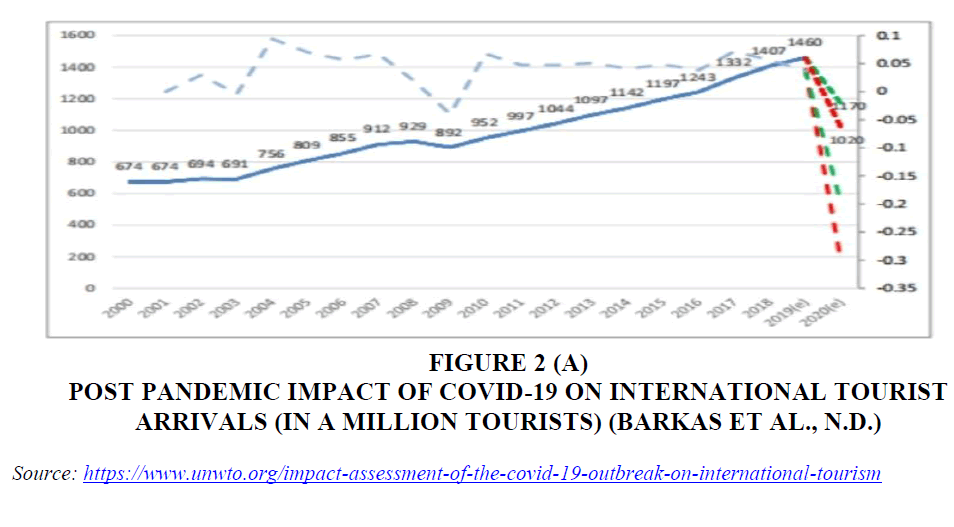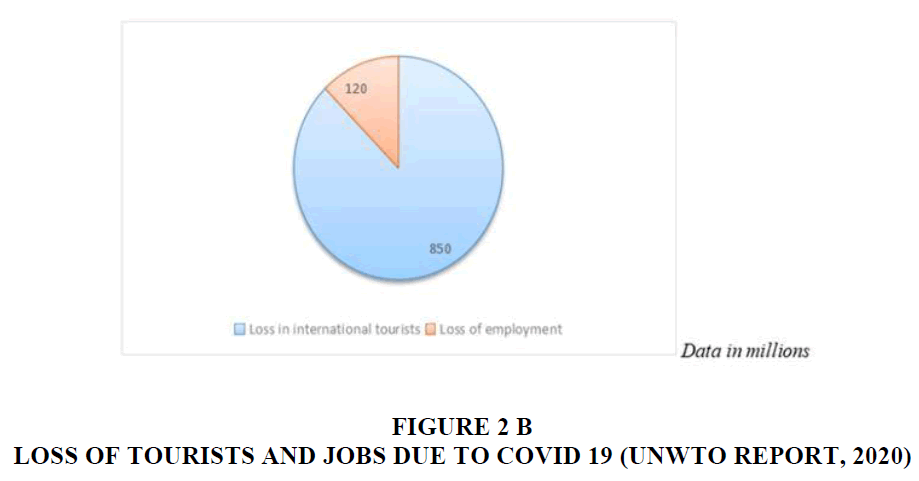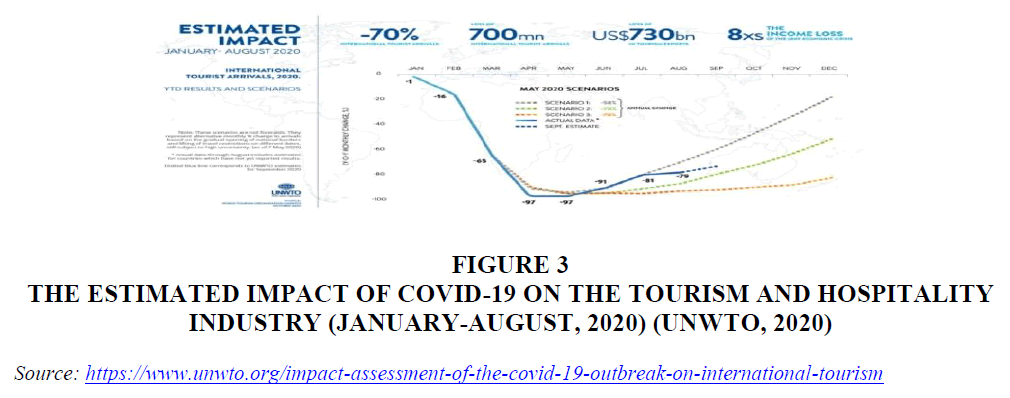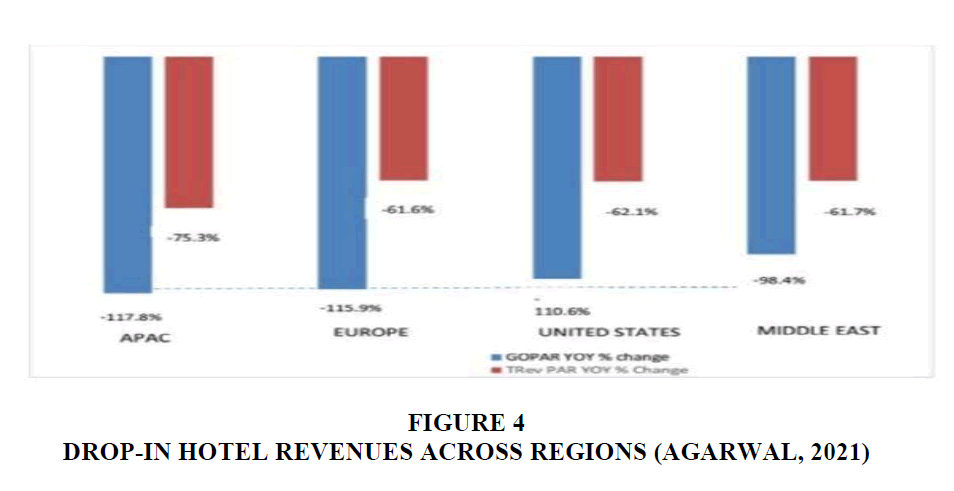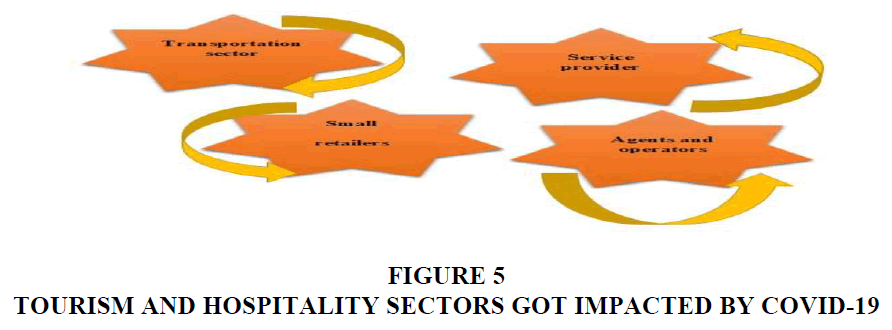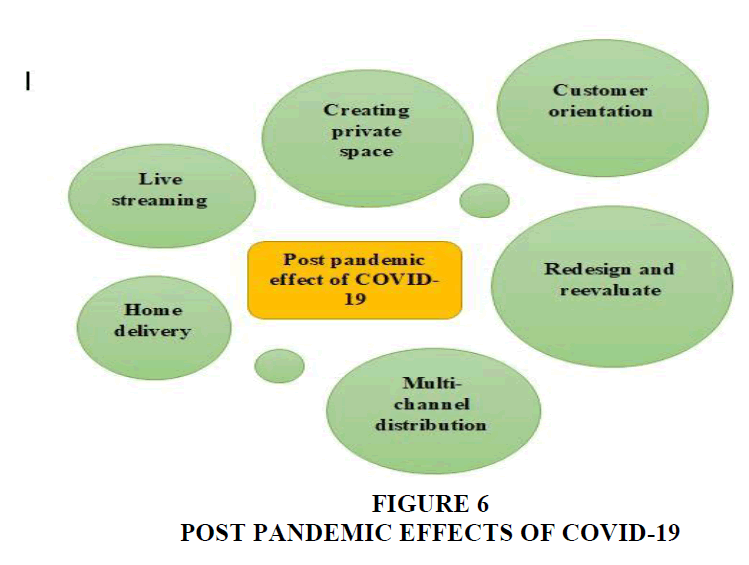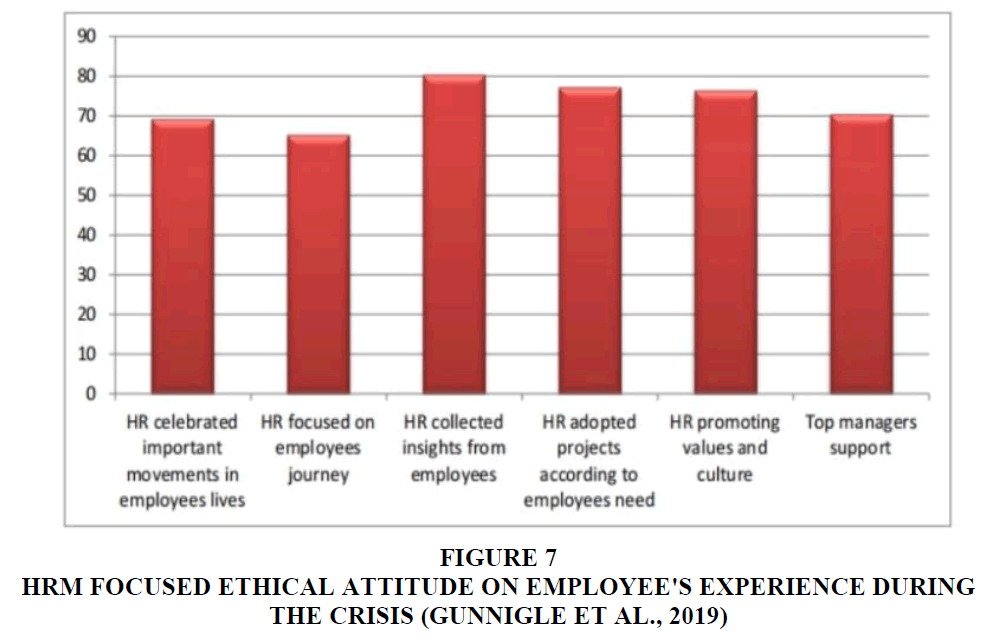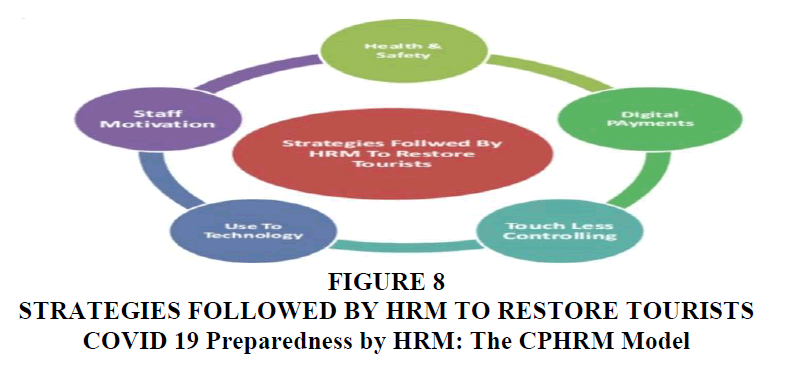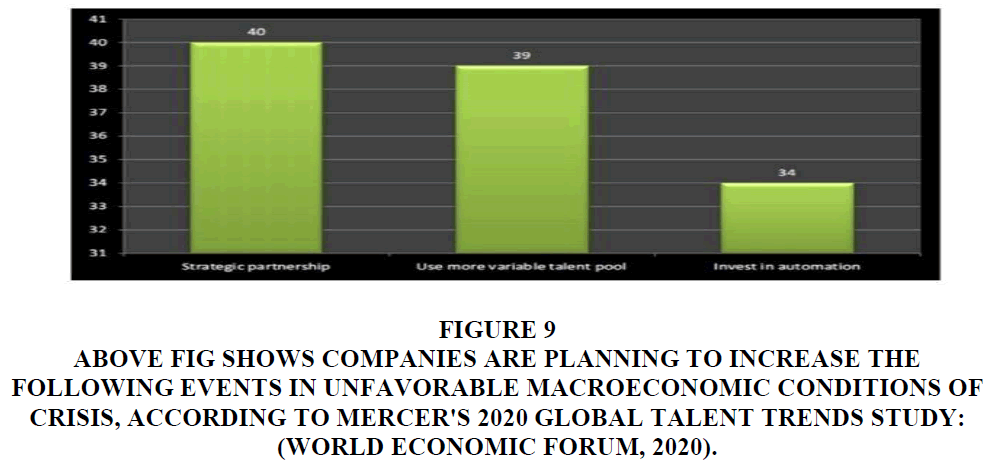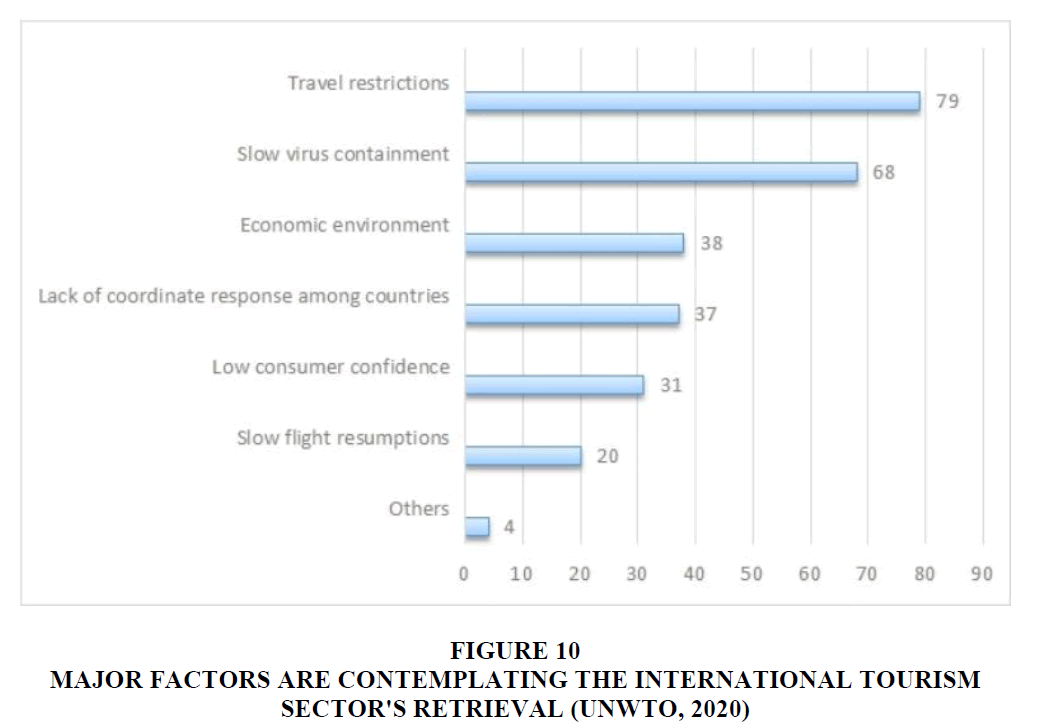Research Article: 2024 Vol: 27 Issue: 3
Impact of COVID-19 on tourism and hospitality sector: Ethical perspective on HRM preparedness and challenges.
Rashmi Singh, GLA University
Citation Information: Singh, R. (2024). Impact of covid-19 on tourism and hospitality sector: ethical perspective on hrm preparedness and challenges. Journal of Management Information and Decision Sciences, 27(3), 1-13.
Abstract
COVID-19 has done serious damage to the business and industries in the general and tourism and hospitality sectors in particular. To prevent its spread and survival from its effects without any vaccine has led to government restrictions on travel and the lockdown, which have adversely impacted these industries. Along with the nationwide lockdown, this has made the government pause global travel; all the businesses have been closed except for the basic needs. It has brought a huge loss to the economy as both tourism, and the hospitality sector contributes to the economy. The paper is based on a review that aims at addressing the challenges faced by HRM to deal with the pandemic situation during corona and their preparedness to deal with the post-pandemic situation from an ethical point of view, as there is an immense need to incorporate the ethics with HRM to deal with future situations like novel coronavirus in future.
Keywords
COVID-19, HRM, Business Ethics, COVID-19 Prepared HRM, Post Pandemic, Tourism And Hospitality Sector, Industry, People-Environment Fit Theory.
Introduction
The current grand challenge of COVID-19 Carnevale & Hatak (2020), followed by lockdown and restrictions on travel, has resulted in a great shock for the Tourism and hospitality sectors (Alonso et al., 2020). Both sectors contribute a major portion to India's GDP and are the financial backbone of the economy. Being a huge contributor to the economy, this requires keen attention from both industries and the government to revive it from the impact caused due to COVID-19 Figure 1.
In light of the COVID-19 crisis, tourism and hospitality-related studies are only starting to emerge at this point (Higgins-Desbiolles, 2021; Hoque et al., 2020; Gössling et al., 2020;
Zhang et al., 2021). The tourism sector strongly supports economic inclusion and has constantly helped in GDP growth over the last decades; this signifies the sector's importance to the world economy and contribution to related sectors like construction, retail trade, real estate, etc. MSMEs contribute around 80% to this sector, and income is associated majorly with about 78.6%; this makes this sector highly important to the countries, especially for the small countries. Figure 1 shows the tourism sector's contribution to economies GDP, employment, service exports, and global exports and related growth of the tourism and hospitality sectors in 2011- 2019 (Hu et al., 2021).
Federation of Associations in Indian Tourism & Hospitality (FAITH) has estimated a loss of about INR 5 lakh corer to 10 lakh corers to the tourism sector (Kaushal & Srivastava, 2021) and about 90,000 corer loss to the hospitality sector, which has raised some serious questions on the present and future existence of both the sectors (Shahi & Neloy, 2020) Figure 2A.
Figure 2a Post Pandemic Impact of Covid-19 on International tourist Arrivals (In a Million Tourists) (Barkas et al., N.D.)
Source: https://www.unwto.org/impact-assessment-of-the-covid-19-outbreak-on-international-tourism
The hospitality sector has experienced a huge loss due to the decrease in sales. The occupancy rates have been dropped down due to social distancing and a decline in tourists' number Kumar Mishra (2020); about 80% of hotel rooms are empty. U.N. World Tourism Organization (UNWTO) estimating a decline of about 70% in arrivals with no expected recovery till 2023. It has also resulted in about 70% loss of jobs in 2020 as these sectors are very labor- intensive for high and low-skilled workers (Kaushal & Srivastava, 2021). It reveals that it will take time to get the thing back to normal; hence, the paper's review focuses on the impact of COVID-19 on the tourism and hospitality sector and highlights ethical strategies and preparedness by HRM to deal with the situation (Hall et al., 2021)
UNWTO has estimated the international tourist arrivals by early April to drop 1-3% in 2020. The sectors' economic activities had seen a downwards of about 20-30% decline compared to 2019, which leads to a drop of about 290 to 440 million international tourists in 2020, compared to 2019. The recent estimates show a decline could be high, about 60-80%. UNWTO, 2020 has expected that there was about 9-12% fall in international tourist arrivals in 2020, in Asia pacific regions, the most affected sector, as shown in Figure 2A and Figure 2B.
Impact of Covid-19 on the Tourism and Hospitality Sector
The tourism and hospitality sectors are the financial backbones of the economy. The economy will be affected tremendously without its support (World Travel and Tourism Council (WTTC). Due to the coronavirus's impact, both industries have seen a decline of 1-3 %, causing an anticipated loss of USD 30 billion to USD 50 billion in international tourism. It has been estimated to decline 60 – 80% by the end of 2020. The sectors have experienced about USD 22 billion loss resulting in 50 million jobs (Agarwal, 2021) Figure 3 and Figure 4.
Figure 3 The Estimated Impact of Covid-19 on the Tourism and Hospitality Industry (January-August, 2020) (Unwto, 2020)
Source: https://www.unwto.org/impact-assessment-of-the-covid-19-outbreak-on-international-tourism
Figure 4 Drop-In Hotel Revenues Across Regions (Agarwal, 2021)
COVID-19 has resulted in a huge financial loss to both sectors, as clear from Figure 4. However, still, there are sides connected to tourism and hospitality sectors that remained unnoticed and got impacted very badly due to the pandemic, which includes: the transportation sector as many tourists choose to travel places through airlines and roadways, which has stopped due to the outbreak of coronavirus resulting into a loss for them; this has also impacted the travel agents and the operators immensely as inquiries or bookings have stopped, and the previous booking was canceled (Webster & Ivanov, 2020). Along with this, there is various type of service providers available for tourists such as river rafting, tracking, mountaineering, etc. also get affected due to the lockdown (Zheng et al., 2020). The impact of COVID-19 cannot be ignored in the case of small retailers. Most retailers at tourist's place earn their income from tourist visitations, including retailers like Kashmir's handicrafts, Ladakh's clothing, etc. All the stores have shut down due to the coronavirus (Sharma & Dolkar, 2020). The review of the paper has also suggested that among the different scales of hotels, the luxurious and the independent hotels have been majorly impacted negatively due to the outbreak of COVID-19 (Hao et al., 2020) Figure 5.
Post Pandemic Effects on Both the Sectors
The pandemic has changed all the supply-demand management of tourism and hospitality sectors, which now require redesigning and reevaluating the existing model and bringing out new agendas for competitiveness. COVID-19 has challenged the hotel industry to restructure and come up with a more diversified distribution channel. The industries are now focusing on facilitating multi-channel platforms; for example, hotels can increase their functioning by accommodating all services catering, public services offline and online, retailing, etc., utilizing their maximum space. Many hotels have also started food home delivery to reduce the risk of spread. Many hotels using this opportunity have also interacted with their customers through live streaming to display their products. Post covid-19 era has brought many changes to customer preferences and their behavior. Therefore, hotels are rendering customer-oriented services like providing services keeping health and hygiene as a consumer concern is the basic requirement of post COVID effect (Jiang & Wen, 2020). Hotels now focus on creating a balanced lifestyle, fitness centers, exercise at will for their customers within a room. Both sectors also encourage private space for their customers, such as private dining rooms, kitchens, and washrooms, to avoid unnecessary touch. Post pandemic has also resulted in the enhancement of digitization of the industries. Hotels focus on enhancing digital customer relationship management to provide customized services according to individual preferences and improve customer engagement and loyalty. The use of digital services having no personal touch has increased customer's confidence and satisfaction. Post pandemic effect has also reshuffling small and medium enterprises as they have pushed to upgrade themselves with high quality of services. The rebranding of these hotels has also provided them an opportunity to maintain a strong sales and marketing system (Hao et al., 2020) Figure 6.
H.R. Attitude towards the Situation: Ethical and Unethical
Nationwide lockdown to curb the virus's spread has resulted in frequent changes in both the employer's and employees' attitudes. Factors like work from home, life-sustaining, work-life balance, turnover have adversely impacted their psychological and mental health. To tackle the
situation and create a positive environment, HRM has come up with ethical solutions to it, including webinars, tutorials on mindfulness, assistance programs, and virtual counseling, which has helped the employees mitigate the stress. To buffer out the stress, HRM has also maintained clear and consistent communication with the employees throughout the pandemic for both domestic and international workers. HRM has used a flexible working hour policy for employees to do the work and provide coaching and training sessions to teach the employees how to work from home. HRM has taken initiatives to build a trust-based environment depending upon commitments and trust between employer and employees. Many organizations also supported their employees by not deducted their salaries at this crucial time of crisis. The review of the paper also highlights that HRM has encouraged their employees through virtual motivation, engaged leadership, peer support, building community, providing remunerations, giving virtual rewards, redesigning employees' jobs, and constructing knowledge management. HRM also supported employees with health care facilities; along with this, they also adopted E-monitoring and E-control to provide virtual feedback and keep track of employee's work Figure 7.
Figure 7 HRM Focused Ethical Attitude on Employee's Experience During the Crisis (Gunnigle et al., 2019)
Contradicting the same, few aspects also highlight unethical attitudes of HRM during COVID-19. The crisis has resulted in HRM increasing the workloads, job pressure, and long working hours of employees, impacting their mental health, well-being, and work-life balance. They linked the salaries of employees with their performance, and in many cases, organizations had terminated the employees, which had resulted in a huge turnover of employees during the crisis. Recruitment was not taking place in many organizations, and the HRM team was not providing any or less than 1-hour training to their employees.
Ethical Strategies Suggested For HRM to Restore the Trust of Tourist
The situation caused due to the coronavirus had held to a huge panic situation all over the globe which had stopped the travel of any means within the nation or outside the nation's boundaries. The fear of losing lives is still haunting people's minds, due to which both sectors are struggling a lot to win the confidence of tourists. To increase the arrivals rate and restore tourists' trust, HRM incorporates ethical strategies to help them bring everything normal. The pandemic's effect on employee's safety during the crisis gap in the hospitality sector literature was another major concern of HRM (Zhang et al., 2021). The paper's review highlights four main dominants to get through the situation: HRM, continuity, hygiene, and concerns (Kaushal & Srivastava, 2021). Experts also felt that multitasking was a former solution to reduce the effects of the crisis and retain the employees for the long run, which means that the managers should evolve their activities related to employee engagement in various jobs. The main consideration to the strategy follow-up is health and safety, which relates to the maintenance of hygiene and sanitation of hotels and tourist places (Ivanov & Webster, 2017). HRM is planning to a soft opening with providing essential services only. Hotels are maintaining experienced staff with proper gloves and masks. HRM is also trying to embed technology's use as far as possible to avoid the human touch by enabling self-check-in codes on guest's mobiles. Mobile apps are connected to all the switches so that they can avoid the hand touch. They are encouraging tourists to use in-room dining. They are also using digital systems for the payments of bills (Sigala, 2018).
HRM uses ethical strategies to maintain relations with their staff by providing them advance salaries and interest-free loans, making the staff provide a high quality of services, gaining a competitive advantage, and bringing goodwill for both sectors. HRM is also planning for enabling crisis management team formulation to overcome the effect of the crisis. In addition to this clear and consistent communication among hospitality and tourism stakeholders, preparing ourselves for global health emergencies with the assistance of WTTC and UNWTO will also help to revive from the shock. The utilization of artificial intelligence and robotics in the industry can also help to deal with the situation (Ivanov & Webster, 2017; Yang et al., 2020). Along with this asking for Covid-19 negative report for checking-in, the hotels and restaurants have also helped HRM regain tourists' trust. A review of the paper suggests the HRM must organize the work effectively, support the staff by motivating them and create loyalty among the customers to restore employees ethically Figure 8.
Figure 8 Strategies Followed by HRM to Restore Tourists Covid 19 Preparedness by HRM: The CPHRM Model
After the massive hit from the outbreak of a pandemic, the industry is now trying to recover and redesign itself according to the new normal (Sigala, 2020). The key to keeping up with the healthcare facilities at the time of crisis lies with middle management. They train front- line staff and guide primary level managers to implement various measures to prevent the infection (Wu et al., 2020). It is very important to learn how to respond and manage such crisis and their implication to provide stability to businesses and society (Aminizadeh et al., 2019). As a matter of huge concern, HRM is now preparing themselves with anti-pandemic preparedness solutions, which majorly includes forming a disaster management team with a team leader to take command and actions concerning matters. In the crisis, they prepare themselves for innovative communication using online technologies to have a clear and consistent exchange of information, including remote areas, and arranging meetings. In addition to this pandemic, the company should try to retain its high-performance employees. They are considered important to add value to the organization and are competent to multitask. In a pandemic, it is very critical to maintaining customer loyalty (Gursoy & Chi, 2020). Many hotels have initiated to extend their loyalty program membership, free cancellation, rebooking assistance, and increasing benefits of employee membership to maintain their customers' trust (Hao et al., 2020). Organizations should explain their health-protective measures to their customers to regain their trust and confidence (Jones & Comfort, 2020). HRM is also planning to implement technological and artificial intelligence to provide contact-free services to their customers and assure their safety. For example, Alibaba's travel business has launched its worry-free accommodating service for customers. HRM should also strengthen their financial strategies and focus on government policies related to providing financial aid to the firms to survive bankruptcies and avoid a layoff. Similarly, the government is also providing subsidiaries to the hotels to revive back from the shock (Rodríguez-Antón & Alonso-Almeida, 2020). Organizations can also get involved with their customers online and prepare their sales strategy Table 1. HRM should try to collaborate with their parental firms to avoid the financial crisis, avoid extra expenses, and establish an efficient and responsive disaster management system to address disasters and emergencies. Along with this, HRM should also create a team of expert consultants and establish an expert mechanism to obtain enough understanding of disasters and be well prepared for this pandemic in the future Figure 9.
Figure 9 Above Figure Shows Companies are Planning to Increase the following Events in Unfavorable Macroeconomic Conditions of Crisis, According to Mercer's 2020 Global Talent Trends Study: (World Economic Forum, 2020).
| Table 1 Mercer Report on how to return from the Covid-19 Crisis (World Economic Forum, 2020). | |
| Highly prepared, highly resilient companies like high tech, financial service, or online retail Strategic focus: customer demand and Achieve advantage of using digitization People focus: Improve employee experience and career opportunities to retain well- performing, valuable employees and regain employees' trust. |
Highly prepared, less resilient companies like professional services Strategic focus: Examine core competencies of the company and transform those to adjoin the market and businesses. People focus: know employee's skills and knowledge, motivate them, and focus on value creation |
| Not prepared, highly resilient companies like education, health care. Strategic focus: Examine how similar firms have been flourishing and what modifications they have adopted to revive and prioritize business transformation. People focus: Firstly, focus on short-term solutions to meet the supply requirements. |
Not prepared, less resilient companies like metal manufacturing companies Strategic focus: Rapid digitization for nonessential activities, explore the areas of diversification and business model redesign. People focus: Establish twinning by providing loan to talent, build co-reliance between companies and support employees to find new jobs, protect them with health benefits and job. |
Pragmatic Value Assessment of CPHRM: Business Ethical Perspective
Being a most vulnerable industry to numerous environmental, political, socio-economic risks, tourism is used to and has become resilient in bouncing back Novelli et al. (2018) from various crises and outbreaks. However, the pandemic's impact has been crucial for the tourism industry, and this industry's recovery is urgently required Table 2. We must prepare ourselves for the pandemic concerning practical and medical aspects and ethical issues (Druml, 2020). Most researchers have focused on food marketing and food safety in the hospitality sector, as restaurants have been majorly responsible for frequently growing foodborne diseases. Hence, it is very much required for the hospitality sector to prepare themselves incorporating ethical values into their HRM policies in tackling the situation and win the confidence of their customers (Hao et al., 2020).
| Table 2 Ethical Perspective of different Companies Towards Measures of Crisis Preparedness (Economic Times, 2020) | |
| Companies | Preparedness measures: Ethical perspective |
| American MNC Hyatt, Delhi | They do not have any confirmed cases among their employees as they have been taking daily temperature checks for all their employees when they enter and exit the firm and taking all the required precautionary measures required |
| British MNC InterContinental Hotels Group (IHG) | They have been taking every brief from the corporate office. They incorporated precautionary measures for themselves and their guests to all its India-based hotels, including checking the negative corona reports, temperature checks, and disclosing any symptoms related to corona. |
| Vinay Malhotra, at outsourcing and technology services company VFS Global | Their organization is investigating to mitigate the concern of individuals related to busy public places. He said they are also providing discounts on courier return services for those who do not want to visit the center to return their visa. Therefore, now they can return their visas from their office or home. |
| Rattan Keswani, deputy managing director at Lemon Tree Hotels | Their hotels are ensuring safety and hygiene levels continuously. She said that their staff is vigilant about everything and is alerting them if they find out something. |
| Hari Sukumar, vice president of operations at Jaypee Palace Hotel & Convention Center, Agra | They have issued very strict safety guidelines for their employees, ensuring no physical contact of any type with any guest. In addition to this, hotels also provide online training to their staff, supporting and encouraging them by providing them annual leaves and reducing their working hours (Hao et al., 2020). |
Research orgasm and advanced tourism research are required to deal with the situations like COVID-19; others have also suggested adopting inter-disciplinary (Wen et al., 2021), multi- disciplinary (Gössling et al., 2020, Hall et al., 2021) or even anti-disciplinary (Sigala, 2020) research to enable creative thinking that challenges and goes beyond existing pre-assumptions and mindsets. The same industries adopt measures by enforcing precautionary measures for their guests' safety and hygiene (Economic Times, 2020).
Many hotels have also initiated free meals, transportation, and accommodation to their front-line staff (Figure 10). Hotels are also becoming customer-oriented by communicating to customers online and developing their sales strategies according to that. Incorporating ethical values in the organizations will add some moral qualification and moral status to the companies now, but it will surely repay much more to the future industries (Mishra, 2017).
Figure 10 Major Factors are Contemplating the International Tourism Sector's Retrieval (Unwto, 2020)
The above figure represents expert opinion travel restrictions and slow virus containment as the major factors that are contemplating the retrieval of international tourism back to normal.
Conclusion
COVID-19 has resulted in a great shock for the Tourism and hospitality sector. Both sectors contribute a major portion to India's GDP and require a quick revival as a major contributor to the economy. Pandemic has resulted in a decline of 1-3 %, causing an anticipated loss of USD 30 billion to USD 50 billion in international tourism and has experienced about USD 22 billion loss, resulting in 50 million jobs loss. Similarly, it has also impacted the transportation sector, travel agents, service providers, and small retailers earning dependent on these industries. For regaining the trust of tourists, industries are now using digitization and artificial intelligence. HRM is thinking about employees' welfare and well-being and training them to perform better in the digital space. HRM has taken initiatives to build a Trust-based environment depending upon commitments and trust between employer and employees. The research about COVID-19 impacts and recovery on hospitality is under construction with most contributions, conceptual or critical reflections and scarce empirical research. Therefore, the situation is unpredictable. To reduce the effects of the crisis and retain the employee's industries are adopting measures like maintenance of hygiene and sanitation of hotels and tourist places, maintaining experienced staff, enabling self-check-in codes on guest's mobile, and in-room dining. Apart from this, they are gaining knowledge on how to respond and manage such crisis
and their implication to provide stability to businesses and society and are preparing themselves to revive back by adopting different strategies and policies.
Acknowledgments
We want to thank Elsevier Covid-19 resource center, PubMed, Springer, Research gate for the research resources and figures to complete this work. The figures which I used in the paper have been suitably cited with reference.
References
Agarwal, P. (2021). Shattered but smiling: Human resource management and the wellbeing of hotel employees during COVID-19. International Journal of Hospitality Management, 93, 102765.
Indexed at, Google Scholar, Cross Ref
Alonso, A. D., Kok, S. K., Bressan, A., O’Shea, M., Sakellarios, N., Koresis, A., ... & Santoni, L. J. (2020). COVID-19, aftermath, impacts, and hospitality firms: An international perspective. International journal of hospitality management, 91, 102654.
Indexed at, Google Scholar, Cross Ref
Aminizadeh, M., Farrokhi, M., Ebadi, A., Masoumi, G. R., Kolivand, P., & Khankeh, H. R. (2019). Hospital management preparedness tools in biological events: A scoping review. Journal of Education and Health Promotion, 8(1), 234.
Indexed at, Google Scholar, Cross Ref
Carnevale, J. B., & Hatak, I. (2020). Employee adjustment and well-being in the era of COVID-19: Implications for human resource management. Journal of business research, 116, 183-187.
Indexed at, Google Scholar, Cross Ref
Druml, C. (2020). COVID-19 and ethical preparedness?. Wiener Klinische Wochenschrift, 132, 400-402.
Indexed at, Google Scholar, Cross Ref
Economic Times. (2020). COVID-19: Hotel chains enforce precautionary measures, issue safety, hygiene advisories.
Gössling, S., Scott, D., & Hall, C. M. (2020). Pandemics, tourism and global change: a rapid assessment of COVID-19. Journal of sustainable tourism, 29(1), 1-20.
Indexed at, Google Scholar, Cross Ref
Gunnigle, P., Lavelle, J., & Monaghan, S. (2019). Multinational companies and human resource management in Ireland during recession: A retrospective from a highly globalized economy. Thunderbird International Business Review, 61(3), 481-489.
Indexed at, Google Scholar, Cross Ref
Gursoy, D., & Chi, C. G. (2020). Effects of COVID-19 pandemic on hospitality industry: review of the current situations and a research agenda. Journal of Hospitality Marketing & Management, 29(5), 527-529.
Indexed at, Google Scholar, Cross Ref
Hall, C. M., Scott, D., & Gössling, S. (2021). Pandemics, transformations and tourism:: Be Careful what you wish for. In Global Tourism and COVID-19 (pp. 123-144). Routledge.
Indexed at, Google Scholar, Cross Ref
Hao, F., Xiao, Q., & Chon, K. (2020). COVID-19 and China’s hotel industry: Impacts, a disaster management framework, and post-pandemic agenda. International journal of hospitality management, 90, 102636.
Indexed at, Google Scholar, Cross Ref
Higgins-Desbiolles, F. (2021). Socialising tourism for social and ecological justice after COVID-19. In Global Tourism and COVID-19 (pp. 156-169). Routledge.
Indexed at, Google Scholar, Cross Ref
Hoque, A., Shikha, F. A., Hasanat, M. W., Arif, I., & Hamid, A. B. A. (2020). The effect of Coronavirus (COVID-19) in the tourism industry in China. Asian journal of multidisciplinary studies, 3(1), 52-58.
Hu, X., Yan, H., Casey, T., & Wu, C. H. (2021). Creating a safe haven during the crisis: How organizations can achieve deep compliance with COVID-19 safety measures in the hospitality industry. International Journal of Hospitality Management, 92, 102662.
Indexed at, Google Scholar, Cross Ref
Ivanov, S. H., & Webster, C. (2017). Adoption of robots, artificial intelligence and service automation by travel, tourism and hospitality companies–a cost-benefit analysis. Artificial Intelligence and Service Automation by Travel, Tourism and Hospitality Companies–A Cost-Benefit Analysis.
Ivanov, S. H., Webster, C., Stoilova, E., & Slobodskoy, D. (2022). Biosecurity, crisis management, automation technologies and economic performance of travel, tourism and hospitality companies–A conceptual framework. Tourism Economics, 28(1), 3-26.
Indexed at, Google Scholar, Cross Ref
Jiang, Y., & Wen, J. (2020). Effects of COVID-19 on hotel marketing and management: a perspective article. International journal of contemporary hospitality management, 32(8), 2563-2573.
Indexed at, Google Scholar, Cross Ref
Jones, P., & Comfort, D. (2020). The COVID-19 crisis and sustainability in the hospitality industry. International journal of contemporary hospitality management, 32(10), 3037-3050.
Indexed at, Google Scholar, Cross Ref
Kaushal, V., & Srivastava, S. (2021). Hospitality and tourism industry amid COVID-19 pandemic: Perspectives on challenges and learnings from India. International journal of hospitality management, 92, 102707.
Indexed at, Google Scholar, Cross Ref
Kumar Mishra, N. (2020). Social distancing as social engineering & health management: Applied ethics perspective to global management & strategic leadership. Research in Globalization, 100032-100032.
Indexed at, Google Scholar, Cross Ref
Mishra, N. (2017). The Moral Status of Corporations. In Modern Organisational Governance (pp. 47-66). Emerald Publishing Limited.
Indexed at, Google Scholar, Cross Ref
Novelli, M., Burgess, L. G., Jones, A., & Ritchie, B. W. (2018). ‘No Ebola… still doomed’–The Ebola-induced tourism crisis. Annals of Tourism Research, 70, 76-87.
Indexed at, Google Scholar, Cross Ref
Rodríguez-Antón, J. M., & Alonso-Almeida, M. D. M. (2020). COVID-19 impacts and recovery strategies: The case of the hospitality industry in Spain. Sustainability, 12(20), 8599.
Indexed at, Google Scholar, Cross Ref
Shahi, K., & Neloy, H. (2020). Global transition of HR practices in covid-19 pandemic situation: a systematic review through 5P's model of HRM. Management and Human Resource Research Journal, 9(6), 50-57.
Sharma, B. R., & Dolkar, R. (2020). Impact of COVID-19 on Tourism & Hospitality Sector in Union Territory of Ladakh. Managing the Impact of COVID-19 on Financial Services Industry. Publisher: Vidya Kutir Publications, New Delhi, India.
Sigala, M. (2018). New technologies in tourism: From multi-disciplinary to anti-disciplinary advances and trajectories. Tourism management perspectives, 25, 151-155.
Indexed at, Google Scholar, Cross Ref
Sigala, M. (2020). Tourism and COVID-19: Impacts and implications for advancing and resetting industry and research. Journal of business research, 117, 312-321.
Indexed at, Google Scholar, Cross Ref
Webster, C., & Ivanov, S. (2020). Demographic change as a driver for tourism automation. Journal of Tourism Futures, 6(3), 263-270.
Indexed at, Google Scholar, Cross Ref
Wen, J., Wang, W., Kozak, M., Liu, X., & Hou, H. (2021). Many brains are better than one: The importance of interdisciplinary studies on COVID-19 in and beyond tourism. Tourism Recreation Research, 46(2), 310-313.
Indexed at, Google Scholar, Cross Ref
Wu, L. K., Su, W. H., Hsiao, S. H., & Hou, M. F. (2020). Preparedness for the next emerging infectious disease outbreak by implementing strategic human resource management. Journal of the Chinese Medical Association, 83(10), 973-974.
Indexed at, Google Scholar, Cross Ref
Yang, L., Henthorne, T.L., & George, B. (2020). Artificial intelligence and robotics technology in the hospitality industry: Current applications and future trends. Digital transformation in business and society: Theory and cases, 211-228.
Indexed at, Google Scholar, Cross Ref
Zhang, J., Xie, C., & Morrison, A. M. (2021). The effect of corporate social responsibility on hotel employee safety behavior during COVID-19: The moderation of belief restoration and negative emotions. Journal of Hospitality and Tourism Management, 46, 233-243.
Indexed at, Google Scholar, Cross Ref
Zheng, Y., Goh, E., & Wen, J. (2020). The effects of misleading media reports about COVID-19 on Chinese tourists’ mental health: a perspective article. Anatolia, 31(2), 337-340.
Indexed at, Google Scholar, Cross Ref
Received: 05-Mar-2024, Manuscript No. jmids-24-14859; Editor assigned: 08-Mar-2024, Pre QC No. jmids-24-14859(PQ); Reviewed: 22- Mar-2024, QC No. jmids-24-14859; Published: 27-Mar-2024
